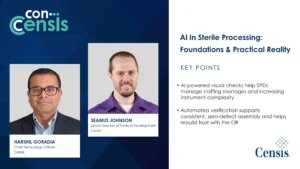How Does the Future of DNA Testing Tie into Heart Health?
The challenges healthcare executives and administrators face are constantly changing. Host Kevin Stevenson talks with the heroes behind the heroes that are enabling hospitals, urgent care centers and telemedicine operators to spend their time tending to patients, while they handle the logistics.
The genetic testing industry is booming. Consumers want to trace their lineage, but there are more exciting applications since genes can point to health issues as well. Discussing the evolution of the field, I Don’t Care host Kevin Stevenson spoke with Alex Mulyar, CEO of CRI Genetics.
“We started in the genealogy route, building up databases, and then began to get into health-oriented reports for weight loss and allergies. Now, we’re looking at more clinical applications like cardiology,” Mulyar explained.
The question became how to apply genetic information to a person’s health. Mulyar spoke about his own results around caffeine consumption. “I received the report, and my metabolism was low but my anxiety gene high, and the recommendation was to drink no more than two cups and never after 2:00 pm.”
The next step for the company was to look at using genetic testing in clinical settings. “We did a lot of internal R&D to figure out how to create a tool doctors could use. It became a blueprint of how people metabolize medications or react to certain things.”
“Those with naturally high cholesterol that look healthy often don’t find this out until after their first heart attack. DNA testing can prevent this.” – Alex Mulyar
The company is now taking learnings to apply them to cardiology. For example, those with naturally high cholesterol can often be fit and healthy. However, they wouldn’t know this is their genetic predisposition until after their first heart attack. “Doctors can do a simple DNA test and understand this, so they can prescribe statins to prevent heart attacks,” Mulyar said.
Further, cardiologists can also use it to understand medication. “If a patient metabolizes medication slowly, they may have dosages building up, or for those metabolize too fast, it could be the opposite,” Mulyar added.
Listen to Previous Episodes of I Don’t Care!
Follow us on social media for the latest updates in B2B!
Twitter – @MarketScale
Facebook – facebook.com/marketscale
LinkedIn – linkedin.com/company/marketscale









